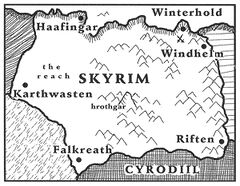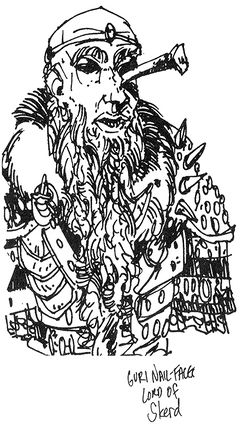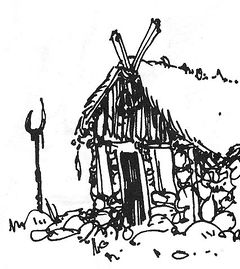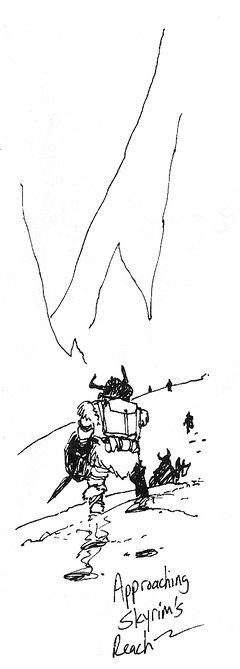User:RobinHood70/Zain
Snow ElvesNords attribute almost any misfortune or disaster to the machinations of the Falmer, or Snow Elves, be it crop failure, missing sheep, or a traveler lost crossing a high pass. These mythical beings are popularly believed to be the descendants of the original Elven population, and are said to reside in the remote mountain fastnesses that cover most of Skyrim. However, there is no tangible evidence that this Elven community survives outside the imaginations of superstitious villagers.[nb 6] |
The TonguesThe Nords have long practiced a spiritual form of magic known as "The Way of the Voice", based largely on their veneration of the Wind as the personification of Kynareth. Nords consider themselves to be the children of the sky, and the breath and the voice of a Nord is his vital essence. Through the use of the Voice, the vital power of a Nord can be articulated into a thu'um, or shout. Shouts can be used to sharpen blades or to strike enemies at a distance. Masters of the Voice are known as Tongues, and their power is legendary. They can call to specific people over hundreds of miles, and can move by casting a shout, appearing where it lands. The most powerful Tongues cannot speak without causing destruction. They must go gagged, and communicate through a sign language and through scribing runes. In the days of the Conquest of Morrowind and the founding of the First Empire, the great Nord war chiefs - Derek the Tall, Jorg Helmbolg, Hoag Merkiller - were all Tongues. When they attacked a city, they needed no siege engines; the Tongues would form up in a wedge in front of the gatehouse, and draw in breath. When the leader let it out in a thu'um, the doors were blown in, and the axemen rushed into the city. Such were the men that forged the First Empire. But, alas for the Nords, one of the mightiest of all the Tongues, Jurgen Windcaller (or The Calm, as he is better known today), became converted to a pacifist creed that denounced use of the Voice for martial exploits. His philosophy prevailed, largely due to his unshakable mastery of the Voice -- his victory was sealed in a legendary confrontation, where The Calm is said to have "swallowed the Shouts" of seventeen Tongues of the militant school for three days until his opponents all lay exhausted (and then became his disciples). Today, the most ancient and powerful of the Tongues live secluded on the highest peaks in contemplation, and have spoken once only in living memory, to announce the destiny of the young Tiber Septim (as recounted in Cyrodiil). In gratitude, the Emperor has recently endowed a new Imperial College of the Voice in Markarth, dedicated to returning the Way of the Voice to the ancient and honorable art of war. So it may be that the mighty deeds of the Nord heroes of old will soon be equaled or surpassed on the battlefields of the present day.[nb 7] |
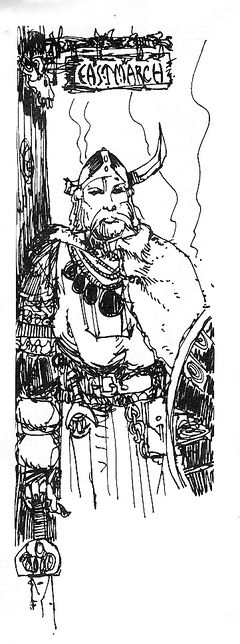
Skyrim, also known as the Old Kingdom or the Fatherland, was the first region of Tamriel settled by humans: the hardy, brave, warlike Nords, whose descendants still occupy this rugged land, and, although perhaps somewhat reduced from the legendary renown of their forebears of old, the Nords of the pure blood still unquestionably surpass the mixed races in all the manly virtues.
Exactly when the Nords first crossed the ice-choked Sea of Ghosts from Atmora, their original homeland, is uncertain. As recorded in the Song of Return, Ysgramor and his family first landed in Tamriel at Hsaarik Head, at the extreme northern tip of Skyrim's Broken Cape, fleeing civil war in Atmora (then rather warmer than at present, as it seems to have supported a substantial population). These first settlers named the land "Mereth", after the Elves that roamed the untamed wilderness which then covered the whole of Tamriel. For a time, relations between Men and Elves were harmonious, and the Nords throve in the new land, summoning more of their kin from the North to build the city of Saarthal, the site of which has recently been located by Imperial archaeologists in the vicinity of modern Winterhold. But the Elves saw that the vital young race would soon surpass their stagnant culture[nb 1] if left unchecked, and fell upon the unsuspecting Nords in the infamous Night of Tears; Saarthal was burned, and only Ysgramor and two of his sons[nb 2] fought free of the carnage and escaped to Atmora. The Elves, however, had reckoned without the indomitable spirit of the Nords. Gathering his legendary Five Hundred Companions (whose names are still recited every Thirteenth of Sun's Dawn at the Feast of the Dead in Windhelm), Ysgramor returned to Tamriel with a vengeance, driving the Elves out of Skyrim and laying the foundations of the first human Empire.
It may be that the exploits of the near-mythical Ysgramor conflate the reigns of several early Nord Kings, as the Elves were not finally driven from the present boundaries of Skyrim until the reign of King Harald, the thirteenth of Ysgramor's line, at the dawn of recorded history. King Harald is also remembered for being the first King to relinquish all holdings in Atmora; the Nords of Skyrim were now a separate people, whose faces were turned firmly toward their destiny, the conquest of the vast new land of Tamriel. Indeed, the history of the Nords is the history of humans in Tamriel; all the human races, with the exception of the Redguards, are descended from Nordic stock, although in some the ancient blood admittedly runs thin.
King Vrage the Gifted began the expansion that led to the First Empire of the Nords. Within a span of fifty years, Skyrim ruled all of northern Tamriel, including most of present-day High Rock, a deep stretch of the Nibenay Valley, and the whole of Morrowind. The Conquest of Morrowind was one of the epic clashes of the First Era, when ensued many a desperate contest between Nord and Dark Elf in the hills and glades of that dire kingdom, still recalled by the songs of the minstrels in the alehouses of Skyrim. The system of succession in the First Empire is worthy of note, as it proved in the end to be the Empire's undoing. By the early years of the First Empire, Skyrim was already divided into Holds, then ruled by a patchwork of clan-heads, kings, and councils (or moots), all of which paid fealty to the King of Skyrim. During the exceptionally long reign of King Harald, who died at 108 years of age and outlived all but three of his sons, a Moot was created, made up of representatives from each Hold, to choose the next King from qualified members of the royal family. Over the years, the Moot became permanent and acquired an increasing amount of power; by the reign of King Borgas, the last of the Ysgramor dynasty, the Moot had become partisan and ineffective. Upon the murder[nb 3] of King Borgas by the Wild Hunt (see Aldmeri Dominion - Valenwood), the Moot's failure to appoint the obvious and capable Jarl Hanse of Winterhold sparked the disastrous Skyrim War of Succession, during which Skyrim lost control of its territories in High Rock, Morrowind, and Cyrodiil, never to regain them. The war was finally concluded in 1E420 with the Pact of Chieftans; henceforth, the Moot was convened only when a King died without direct heirs, and it has fulfilled this more limited role admirably. It has only been called upon three times in the intervening millenia [sic], and the Skyrim succession has never again been disputed on the field of battle.
The land of Skyrim is the most rugged on the continent, containing four of the five highest peaks in Tamriel (see Places of Note: Throat of the World). Only in the west do the mountains abate to the canyons and mesas of the Reach, by far the most cosmopolitan of the Holds of Skyrim, Nords of the pure blood holding only the barest majority according to the recent Imperial Census. The rest of Skyrim is a vertical world: the high ridges of the northwest-to-southeast slanting mountain ranges, cleft by deep, narrow valleys where most of the population resides. Along the sides of the river valleys, sturdy Nord farmers raise a wide variety of crops; wheat flourishes in the relatively temperate river bottoms, while only the snowberry bushes can survive in the high orchards near the treeline. The original Nord settlements were generally established on rocky crags overlooking a river valley; many of these villages still survive in the more isolated Holds, especially along the Morrowind frontier. In most of Skyrim, however, this defensive posture was deemed unnecessary by the mid-first era, and most cities and towns today lie on the valley floors, in some cases still overlooked by the picturesque ruins of the earlier settlement.
Nords are masters of wood and timber construction; many structures survive in use today that were built by the first settlers over 3,000 years ago. A fine example of Nord military engineering can be seen at Old Fort, one of the royal bastions constructed by the First Empire to guard its southern frontier. Towering walls of huge, irregular porphyry blocks fit together without seam or mortar, as if constructed by mythical Elhnofey [sic] rather than men.
The nine Holds present a varied aspect in people, government, and trade. The Reach could be mistaken for one of the petty kingdoms of High Rock; it is full of Bretons, Redguards, Cyrodiils, Elves of all stripes, and even a few misplaced khajiit. The northern and western [sic] Holds -- Winterhold, Eastmarch, the Rift, and the Pale, known collectively as the Old Holds -- remain more isolated, by geography and choice, and the Nords there still hold true to the old ways. Outsiders are a rarity, usually a once-yearly visit from an itinerant peddler. The young men go out for weeks into the high peaks in the dead of winter, hunting the ice wraiths that give them claim to full status as citizens (a laudable practice that could serve as a model for the more "civilized" regions of the Empire). Here, too, the people still revere their hereditary leaders, while the other Holds have long been governed (after a fashion) by elected moots. It is fortunate for Skyrim and the Septim Empire that the people of the Old Holds have preserved the traditions of their forefathers. Skyrim has long been dormant, slumbering through the millenia [sic] while upstart conquerors bestrode the Arena of Tamriel. But now, a son of Skyrim[nb 4] once again holds the world's destiny in his hands. If Skyrim is to awake, its rebirth will be led by these true Nords who remain its best hope for the future. [TRAVELER: I found many of these mountain villages almost empty of young men, who have been seduced into joining Septim's army by promises of wealth and glory; the village elders see little hope of their sons ever returning.][nb 8]
Places of Note
Haafingar (Solitude)
The home of the famous Bards' College, Haafingar is also one of Skyrim's chief ports, and ships from up and down the coast can be found at her crowded quays, loading timber and salted cod for the markets of Wayrest, West Anvil, and Senchal. Founded during Skyrim's long Alessian flirtation, the Bards' College continues to flaunt a heretical streak, and its students are famous carousers, fittingly enough for their chosen trade. Students yearly invade the marketplace for week of revelry, the climax of which is the burning of "King Olaf" in effigy, possibly a now-forgotten contender in the War of Succession. Graduates have no trouble finding employment in noble households across Tamriel, including the restored Imperial Court in Cyrodiil, but many still choose to follow in the wandering footsteps of illustrious alumni such as Callisos and Morachellis.
Windhelm
Once the capital of the First Empire, the palace of the Ysgramor dynasty still dominates the center of the Old City. Windhelm was sacked during the War of Succession, and again by the Akaviri army of Ada'Soon Dir-Kamal; the Palace of the Kings is one of the few First Empire buildings that remains. Today, Windhelm remains the only sizable city in the otherwise determinedly rural Hold of Eastmarch, and serves as a base for Imperial troops guarding the Dunmeth Pass into Morrowind.
Throat of the World
This is the highest mountain in Skyrim, and the highest in Tamriel aside from Vvardenfell in Morrowind. The Nords believe men were formed on this mountain when the sky breathed onto the land. Hence the Song of Return refers not only to Ysgramor's return to Tamriel after the destruction of Saarthal, but to the Nords' return to what they believe was their original homeland. Pilgrims travel from across Skyrim to climb the Seven Thousand Steps to High Hrothgar, where the most ancient and honored Greybeards[nb 5] dwell in absolute silence in their quest to become ever more attuned to the voice of the sky.
These footnotes represent the underlined margin scribbles and remarks that appeared over the original guide, written by an elf known only as "YR".
